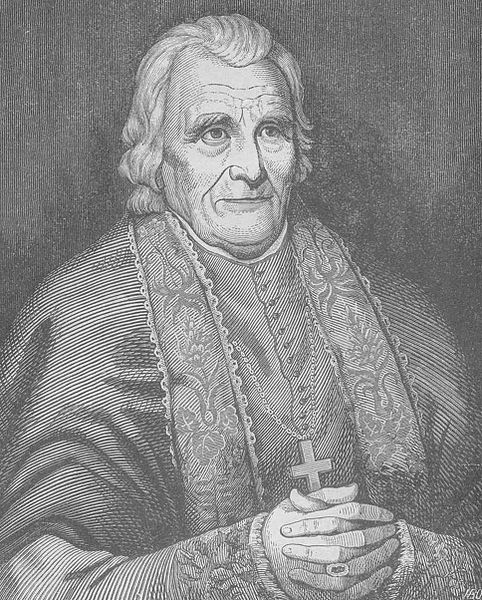Flaget, Bishop Benedict Joseph
1850, February 11
Date of Birth: 1763, November 8
Paris
March 21, 1850
Father and Very Dear in Our Lord:
I have just learned of the holy death of Bishop Flaget, Ordinary of Louisville in the United States of America, and I hasten to inform you of it so that you may satisfy the obligations of the Society in regard to this venerable deceased man.
Bishop Benedict Joseph Flaget, born at Billom in the Diocese of Clermont on November 8, 1763, entered the Seminary of Clermont on November 1, 1783. Admitted into the Society after undergoing the exercises of the Solitude, he filled, before the [French] revolution, various positions in the seminaries of Nantes and Angers. Father Emery sent him to America with Fathers David and Chicoisneau, and he reached Baltimore on March 29, 1792. In that distant land his zeal and his piety were in turn exhibited at the Vincennes trading-post, where he busied himself in the priestly work of a missionary; at Georgetown College; at Havana – obedient, as his superiors set him to work. In 1800 he was assigned to the College of Baltimore [St. Mary’s College] as a professor. He was so engaged when, in 1809, Bishop Carroll, first ordinary of Baltimore, recommended him to the Holy See for a bishopric. Pope Pius VII of holy memory called him to institute and administer the huge Diocese of Bardstown, which included at that time almost all the distant outposts of the United States of America. On the unanticipated news of his promotion, Father Flaget, distraught, returned in a hurry to France with the intention of avoiding the burden which was looming over him; once in France, he came to throw himself into the arms of Father Emery as if to hide there. Father Emery ordered him to obey the head of the Church and to go to administer his diocese, promising him that he would retain all rights to the benefits of the Society. He returned to the United States and was consecrated at Baltimore by Archbishop Carroll on November 4, 1810. The interests of his diocese induced him to travel to Europe in 1837. We had the happiness of seeing him, and we shall never forget the impressive example of humility and simplicity which he gave us. The French bishops gave him the highest and most cordial welcome. He was the recipient of the most touching evidence of the good-will and confidence of the Sovereign Pontiff. Everywhere in his travels he left behind edifying memories.

Bishop Flaget
After his affairs had been attended to, he was in a hurry, as he said, to go to finish his life and labors in the midst of his flock. Scarcely had he learned that I had been named Superior General than he wrote me to remind me of the promise that Father Emery had made him of remaining always as a child of the Society. The annals of the American Church will chronicle the works, the foundations, the success, the virtues of this bishop – a bishop truly great before God and before men for the forty years of his apostolic missionary activity. What is more important to us, Very dear Father, is that sanctify ourselves through his example, filling ourselves more and more with the spirit of our holy rule in which he persevered to the end. A Trappist monk whom I had asked to convey to him my sentiments wrote me last January 10th that as soon as he had proferred from me a picture of our Chapel of Loretto, he bathed it with his tears, proclaiming his unwavering and filial devotion towards the Society. Bishop Flaget died on February 11th of this year.
I am, Father and very dear in Our Lord, very sincerely,
Your thoroughly devoted
